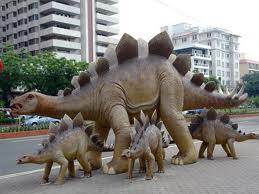Did You Say Dinosaurs? How Dare You!

In a controversial move towards political correctness that even the most hypersensitive, neurotic, obsessive-compulsive observer would say is going too far, the New York Department of Education has banned the use of a long litany of words from appearing in city-administered standardized tests, claiming the ban was conceived as a way to protect the sensitivities of a large variety of students.
Included among the words not to appear on tests are “dinosaurs” “birthdays” “Halloween” and “dancing.” The DOEd wants to avoid students feeling any “unpleasant emotions” liable to be produced when dinosaurs are connected to the unpleasant subject of evolution; Halloween to the forbidden and disturbing practice of paganism; birthdays which will make Jehovah’s witnesses jealous since they don’t celebrate birthdays; and dancing which some students don’t do very well.
Aside from the above more abstract ideas which can make students feel bad, some more concrete references are also to be avoided. The word “poverty” is also banned in addition to any words which refer either directly or indirectly to wealth, because some students might feel “excluded.”
Sy Fliegal of the Center for Educational Innovation said in an interview that the DOEd’s new policy is not needed.
“The Petersons take a vacation for five days in their Mercedes … so what,” Fliegal said. “You think our kids are going to be offended because they don’t have a Mercedes? You think our kids are going to say, ‘I’m offended; how could they ask me a question about a Mercedes? I don’t have a Mercedes!’”
It almost goes without saying that words like “divorce” and “disease” will not be used, just in case someone knows someone who may have been ill, or gotten a divorce, and then of course bad feelings would be created, making it hard for the students to concentrate properly on their test.
Officials from the DOEd defend the policy saying they are just trying to be sensitive to the feelings of a diverse body of students.
“This is standard language that has been used by test publishers for many years and allows our students to complete practice exams without distraction” a Department of Education spokeswoman said. She emphasized that this is not censorship.
Another critic of the word-ban is Robert Pondiscio, who spoke for the Core Knowledge Foundation. According to Pondiscio the elimination of these types of words from our language removes from discussion the subjects which kids actually relate to the most.
“The intent is to avoid giving offense or disadvantage any test takers by privileging prior knowledge” Pondiscio said. “But the irony is they’re eliminating some subjects, like junk food, holidays and popular music, that the broadest number of kids are likely to know quite a lot about.”
